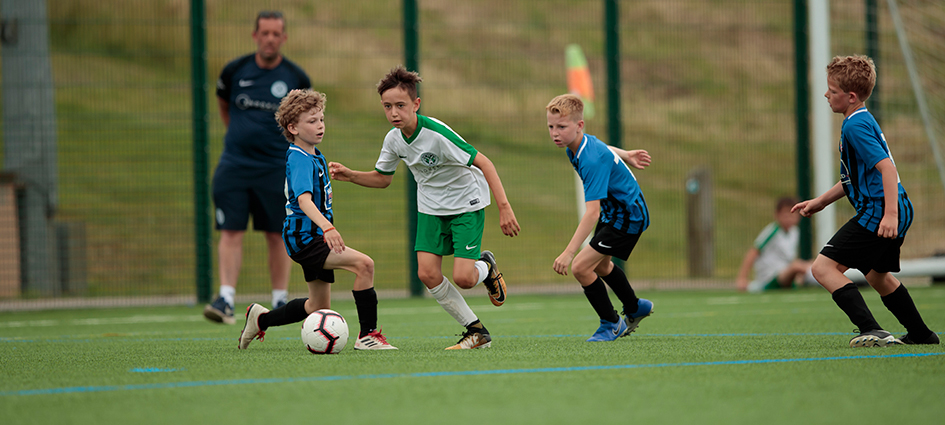
"When are we having a game?"
- Jack Walton
- 15 August 2019
Jack Walton, FA regional coach development manager, explains why coaches should use games to engage their players at training.
“When are we having a game?” - I’d be willing to bet that this is the question that coaches up and down the country probably get asked most often.Why is this? Don’t these kids realise how much time and effort we’ve put into researching and planning this nice, neat and tidy drill? Those six words are enough to sink the spirit of the most well-intentioned.
What is a game?Noun:
1. A form of competitive activity or sport played according to rules.
2. An activity that one engages in for amusement.
A game in a coaching context isn’t necessarily ‘the game’ – the version they experience on a weekend. Although, it may well be. A game, simply, may be a practice that has rules, some form of scoring system and/or competition.
Why use games?Unlike repetitive drills the decisions that the players make in games are not pre-determined by the practice or the coach and the outcomes are uncertain. A bit like a match.
Games provide excitement through their realism and they engage. They can be manipulated to challenge the players appropriately.

These ingredients of freedom offer a glimpse as to why games are so enjoyable.
‘I’m going to stop learning this because it’s too much fun,’ said no-one, ever. Games give the players the opportunity to develop their craft for the match.
A few years ago, as a frustrated high handicap golfer, I figured out the main reason (among many) that was stopping my aspiring path to single figures - my short game.
The constant, repetitive drills I was practising ripped straight off YouTube were bringing short-term success on the practice range, but my handicap remained closer to my age than I wanted. I couldn’t repeat it when it mattered.
A friend then recommended some simple chipping games. They provided me with variety, fun, challenge and engagement. I found myself regularly in states of flow in practice where hours went by without me noticing. I was competing. Against myself. Trying to beat the game.
If us adults weren’t around, games are what the players would play. Ever remember queuing up ten deep or standing in nice neat lines during break time at school? Nor me.
Remember ‘Wembley doubles’, ‘heads and volleys’, ‘three-and-in’ and everything else we played on the street? Me too. There was a reason for this. We were, perhaps unintentionally, developing our craft.
So what are we to do?It’s training night and the parents and players have arrived. The latter giddy with excitement. The former interested to see what practices we have prepared to teach to their sons and daughters.
We need to reassure the parents that developing players learn best through games. That such practices will often look chaotic and messy instead of being tidy and regimented - just like a match.
Keep it simple. One of the reasons why our beautiful game is the world’s most popular sport is due to its simplicity. Two teams, two goals, one ball.
As legendary NFL player and coach, John Madden said: "The fewer rules a coach has, the fewer rules there are for players to break."
The same can be said for the practices that we design for our players to learn from. If in doubt, think how might I add simple rules, scoring and competition? Or even ask the players what they would do. They may surprise us.
Maybe where we’ve gone wrong in the past is because we’ve used ‘the game’ as a carrot – “If you’re good and do these practices then we’ll have a game at the end.”
Or “It’s your game time at the end you’re wasting.” This carrot is one that is often dangled until the end of training - until we feel as though we’ve got what we want from the session.

I’ve often had coaches ask me why their players’ behaviour is erratic until they have a game. The irony is that the thing we are trying to help the players get better at (‘the game’) is the thing that we often try to use to control their behaviour. It is the thing that we don’t feel that they’ve earned until they’ve ‘mastered the basics’.
Why is this practice so common? It’s similar to telling children that “if you’re good and eat all your vegetables then you’ll get a desert.” (Is it any wonder that vegetables – and indeed repetitive drills – have such a bad name among so many kids?).
What this tradition of coaching practice also does is wait until the players are more fatigued – at the end of the session – until they start practising the things that they are more likely to be repeating at the weekend.
"We do not rise to the level of our expectations. We fall to the level of our training." - Archilochus, Greek Soldier, 650 BC.
So when are we having a game?Whenever possible.
I set myself a challenge some years back now to eradicate this question from my coaching. The players I’m lucky enough to work with currently trust that our practices will be all about games.
I’ve noticed that players who are trained on a diet of games arrive at training much more relaxed as they know that their session is not about to be dominated by the coach and they will have the chance to apply and expend their stored creative energy.
And what of my golf? Well my handicap soon dropped to a lifetime low. But then I stopped playing games.
This article was first published in The Boot Room magazine in August 2016.


